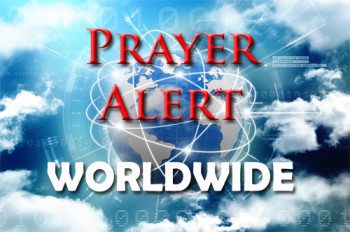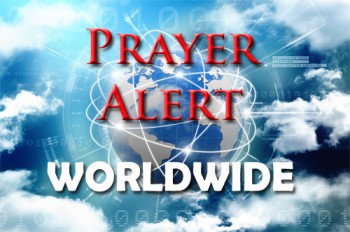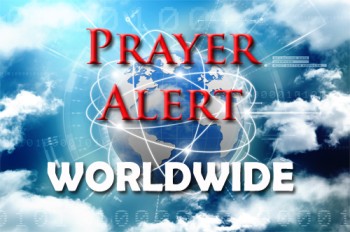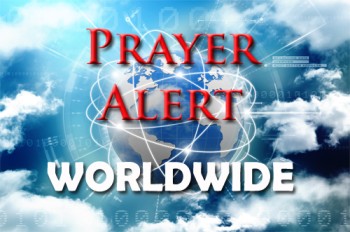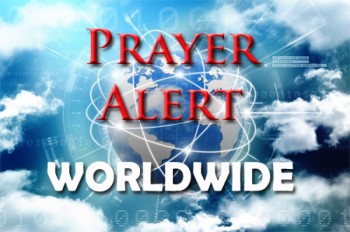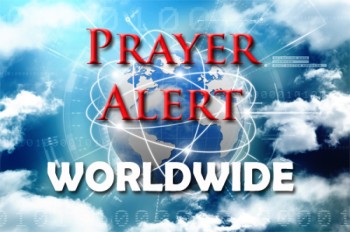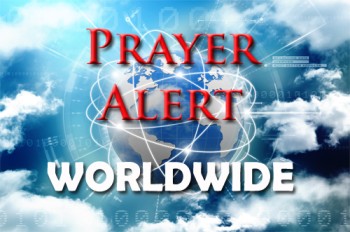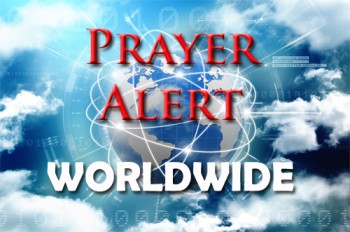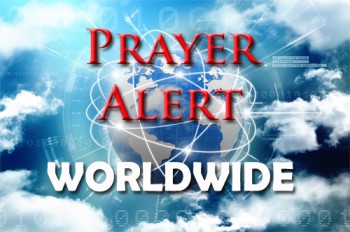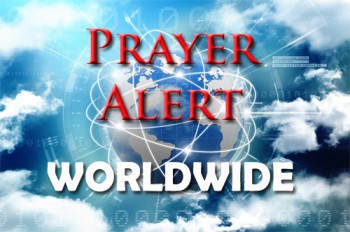Displaying items by tag: Civil War
Sudan: USA urges both sides to new ceasefire talks, many millions facing acute hunger
The USA is launching new peace talks to end Sudan’s 16-month civil war, driven by fears that the conflict is plunging the country into potentially the worst famine in decades. Sudan’s military, one of the two warring factions, had originally agreed to attend the negotiations in Switzerland, but changed their minds after a drone attack on the army chief, dashing hopes for a quick ceasefire. The talks aim to broker a ceasefire and secure humanitarian access for over ten million displaced people. Famine has been declared in Sudan’s Darfur region, with estimates suggesting up to 2.5 million people could die of hunger by September. Only one-third of the $2.7 billion requested by the UN for Sudan has been received so far: the UN fears that as many as 26 million face acute hunger. See
Sudan: army chief survives drone attack
Sudan's military commander, Gen Abdel-Fattah Burhan, has survived a drone attack at a military graduation ceremony which killed five people. The attack occurred as the conflict continues between the Sudanese army and the Rapid Support Forces (RSF), with military leaders now operating mainly in the east of the country. The drone strike followed the RSF announcement of upcoming ceasefire talks in Switzerland, hosted by the USA and Saudi Arabia. The foreign ministry expressed readiness to participate but emphasised the need to protect civilians and accused the RSF of being the only party attacking cities, villages and civilians. The UN reports that over 4.6 million people have been displaced by the conflict, with many fleeing to safer areas within Sudan or neighbouring countries.
Sudan: army gains control of broadcasting headquarters
Sudan's army has reclaimed the state broadcaster's headquarters in Omdurman, marking a symbolic victory in its eleven-month civil war against the Rapid Support Forces (RSF). The RSF had held the building since the conflict began but had not been able to transmit from it; state television has continued to show pro-army content, broadcast from elsewhere in the country. Despite UN calls for a ceasefire during Ramadan, intense fighting has continued in several parts of Khartoum. This recapture signifies a major setback for the RSF, which had used the headquarters as a stronghold. The conflict, stemming from disagreements between military and RSF leaders over a political transition to civilian rule, has displaced millions, devastated Khartoum, and triggered ethnic violence in Darfur. International efforts to broker peace have faltered, and the humanitarian toll remains dire, with warnings of growing hunger and continued displacement.
Syria: drone attack kills over 100
Over a hundred people, including ten civilians, were killed and another 125 were injured when drones carrying explosives targeted a graduation ceremony at a military academy in Homs. The army blamed ‘terrorist groups backed by known international forces’, and said it would respond with full force and determination against these terrorist groups ‘wherever they are’. There was no immediate claim from the rebels and jihadists battling the government in the country's civil war. The attack is believed to have been launched from opposition-held areas north-west of Homs. An eye-witness said, ‘After the ceremony, people went down to the courtyard and the explosives hit. We don't know where it came from, and corpses littered the ground.’ Syria's defence minister attended the graduation ceremony, but left minutes before the attack.
Sudan: Sinking deeper into civil war
The International Criminal Court has opened another war crimes probe after three months of war between feuding generals. 87 bodies were buried in a mass grave by the Rapid Support Forces (RSF) paramilitary group prompting a UN warning of possible new massacres in Darfur. The ICC has been investigating crimes in Sudan's Darfur region since 2005. The UN Security Council charged former leader Omar al-Bashir with genocide and crimes against humanity - murder, rape and torture. Allegations of similar atrocities have mounted during recent fighting. UN officials are calling for the warring sides to face accountability. About 3,000 people have been killed and three million displaced since violence erupted between Sudan’s army chief Abdel Fattah al-Burhan and his former deputy Mohamed Hamdan Daglos. The UN warns history could repeat itself - the people of Darfur have lived with uncertainty, pain and the scars of conflict for almost two decades.
India: Fears of civil war in Manipur
Christian and other minority faith group persecution in Manipur worsens. By 26th May 70+ Christians were killed, 10,000 forced from homes, 300+ churches burned or demolished, and 1,000 Christian homes destroyed as Hindus sought Christians to kill or convert to Hinduism. The Supreme Court ordered the military to maintain peace in the region, but the Hindu nationalist government has done nothing to stop the violence. Open Doors said, ‘If the situation continues civil war is inevitable, with more lives lost, properties destroyed and further open persecution of religious minorities.’ Those who have fled don't have food or shelter and face threats of physical violence. Justin Welby is distressed to hear about these attacks on indigenous tribal Christians, saying, ‘Kailean Khongsai is training for Church ordination and is from Manipur. I join him in praying that regional authorities would protect all minority groups, including Christians and their places of worship, and that justice and peace would prevail.’ See
Sudan: fraught situation for Christians
It is a fraught situation for Christians trapped in Khartoum since Sudan’s civil war erupted on 15 April between the Sudanese army and Rapid Support Forces (RSF) militias. Pastor Desta said living in his area was becoming almost impossible. Fire burned down his church and the local market. ‘Every two days we walk to a distant district to get water and provisions. Most of our neighbours have left. The other day two friends and I took the church car to get water and provisions, then RSF members searched and questioned us. It is getting awful. We are waiting for a couple of days. If it gets worse, we will leave. Many are saying that intense fighting means escape has become too dangerous now that RSF members surround those who remain. RSF uses nearby homes for shelter; they are targeted by the army. Indirectly, we are under siege. Nowhere is safe.’
Myanmar: deadly new tactic in civil war
As Zin Nwe Phyo and her classmates settled down with their teachers, bullets and bombs hit the school and children ran outside to hide. ‘Soldiers fired right through the school walls, hitting the children,’ said one eyewitness. ‘Pieces flying out of the main building injured children in the next building. There were big holes blown out of the ground floor.’ Their attackers were Russian Mi-35 helicopter gunships carrying powerful rapid-fire cannon and rockets which destroy people, vehicles and most buildings. Since Myanmar's military ousted Aung San Suu Kyi's elected government, air strikes like this happen routinely in a civil war at a stalemate across much of the country. Zin Nwe Phyo and many others died that day. Resistance to military attacks on civilian targets has increased humanitarian needs and increased opportunities for Christian workers to share about Christ. Local missionaries care for children sheltering with them, opening the way to share the gospel with their parents.
Syria: time to rethink aid
Contrary to the common perception (‘Syria’s situation has settled, so Syrians no longer need urgent humanitarian aid’) conditions especially in the rebel-held northwest have been worsening. The Assad regime and Russia continue to block access to food, medicine and other vital necessities. The Covid pandemic, the war in Ukraine, and the consequent global economic downturn have exacerbated the crisis. Soaring inflation in neighbouring Turkey has also had a devastating effect on the economy in the region, where the Turkish lira is widely used along with the US dollar. Four million people in north-western Syria urgently need aid. Over 3.1 million internally displaced persons are food-insecure. Clean water is scarce. Cholera is spreading and there is a sharp decline in humanitarian aid. Pray for unconditional access to vital food and water to be guaranteed for all Syrians; International media coverage and fundraising campaigns to boost donations for the Syria crisis; and in the longer term, for Syrians to be able not merely to survive but to rebuild their lives and livelihoods.
Ethiopia: over 200 killed in massacre
An ongoing civil war threatens to tear Ethiopia apart. The latest event is a massacre of over 200 members of the Amhara ethnic group on 19 June. Witnesses claim the Oromo Liberation Army (OLA), a group authorised by the government, was responsible. The OLA denied carrying out the killings, claiming it was committed by a militia group aligned with prime minister Abiy Ahmed and his regional government. The northern region of Tigray saw a rebellion in 2020; this massacre is the worst since then. No one is innocent in this ongoing civil war - both sides have committed mass killings, sexual violence, and ethnic cleansing. The Tigray Liberation Front has joined forces with the OLA against the government on many occasions. Mr Abiy faces many challenges trying to consolidate power among the many ethnic groups, especially the Amharas. Please pray for the different ethnic groups to realise they must work together for peace in nonviolent ways.
